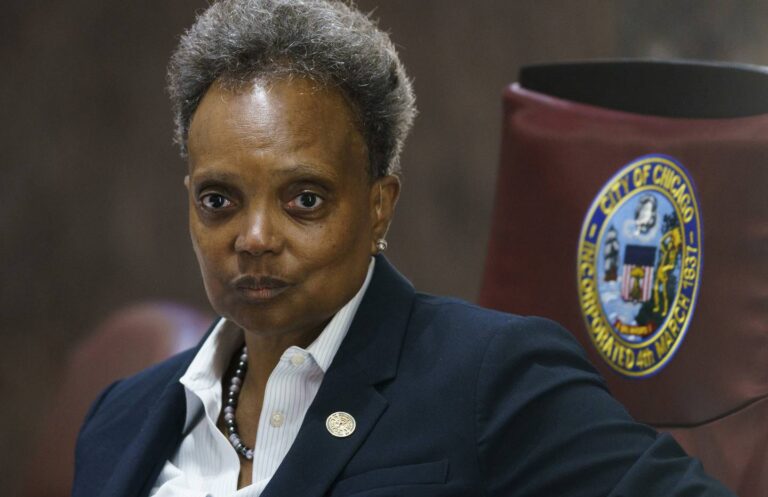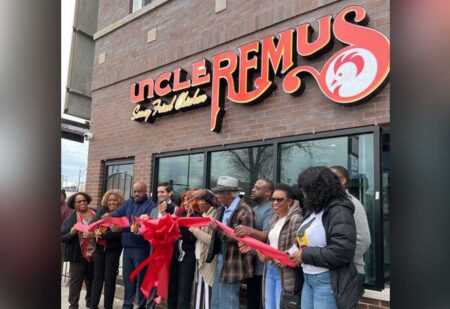Mayor Lori Lightfoot’s 2023 budget includes an increase in funding for the Chicago Police Department, boosted spending for abortion services and no property tax hike — all moves aimed at avoiding negative attention and addressing voter concerns leading into next year’s election.
The mayor cast her 2023 spending plan, the fourth and final one she will present City Council before the February 2023 elections, as a “stability budget” aimed at reducing debt and shoring up historically underfunded pensions.
Advertisement
Earlier this summer, Lightfoot laid out a $127.9 million budget shortfall, marking by far the smallest deficit of her time in office as she campaigns for a second term. Still, Lightfoot had previously said she would ask City Council for a $42.7 million property tax hike — half of what she could seek under her inflation-tied policy, a relatively small increase that nevertheless flew in the face of political convention that urges politicians to avoid higher taxes during election years.
Last week, however, Lightfoot dropped her property tax demand. That cleared the way for a much easier budget process, though she may still face pressure from progressive aldermen and others who want to appear independent of the mayor as they head into the 2023 elections.
Advertisement
Under Lightfoot’s spending plan, the city would provide $3.1 million for reproductive healthcare, an additional $10 million for homelessness and related services, and $13.5 million for public safety.
The city’s police budget will rise to $1.711 billion from $1.699 billion the previous year.
Lightfoot also touted what she said is better financial planning as the city increased its annual pension contributions by $1 billion over the past three years and increased its funding ratios. Chicago also reduced its total outstanding debt by $377 million, she said, through more active cash flow management.
Sign up for The Spin to get the top stories in politics delivered to your inbox weekday afternoons.
In 2021, Lightfoot pushed the City Council to agree to link annual property tax increases to the consumer price index, arguing that it would spare residents the Chicago political yo-yo of mayors jacking up taxes right after getting elected and then refusing to raise them at all when the next election looms and they don’t want to anger voters.
The inflation-linked property tax increase for the 2023 budget was set to be about $85.5 million as inflation jumped well above the 5% ceiling on Lightfoot’s plan tying taxes to the annual increase in the Consumer Price Index. But Lightfoot in August announced she would lower that to 2.5% with Chicagoans struggling to make ends meet.
Lightfoot’s administration last week said revenue for 2022 will come in $134 million above what was projected, “due to improving revenue projections and expected cost savings,” giving the mayor cover to drop her property tax hike.
Amusement taxes are coming in stronger than expected as concerts and other live events move toward pre-pandemic levels. Transaction taxes for property sales are also higher than anticipated, according to the city. So is the amount of money coming in from the state for personal income taxes and corporate income taxes in lieu of property tax.
Advertisement
Initial projections by city officials estimated the 2023 gap would be $867 million. In May, however, Lightfoot budget director Susie Park said finance officials had cut that number down by more than $500 million. The city used various funds, including federal COVID-19 relief dollars, “structural solutions” and increased revenues to narrow the gap to about $306 million, Park said.
The sunny year-end numbers for 2021 were finalized in the city’s annual comprehensive financial report released in late July. The city ended 2021 with a total fund balance of $679.1 million, more than double what it was the year before. Expenses were $107.2 million lower than expected, thanks to COVID grants that could be transferred and “overall operational efficiencies,” the report said.
Last year, Lightfoot announced the city’s shortfall would be $733 million, dubbing her 2022 spending plan as the city’s COVID-19 “recovery budget.” That shortfall represented 5.7% of the previous year’s total budget. Throughout last year’s forecast speech, Lightfoot highlighted a more promising business environment and the beginning of a bounce-back in key city revenues.
Lightfoot closed that gap — and part of the previous year’s gap — with a portion of the $1.9 billion in COVID-19 federal relief money Chicago received, a one-time source of revenue.
The $3.1 million Lightfoot pledged for “reproductive and sexual health access and education” includes abortion care access and builds on the $500,000 she pledged earlier this year when the U.S. Supreme Court overturned Roe v. Wade, ending constitutional protections for abortion.
Advertisement
“Chicago stands as a safe haven for those seeking care across the county. And our status requires resources,” Lightfoot said in prepared budget remarks. ‘This investment is the result of consultations with reproductive health providers across the City and the increased needs that they are facing on a daily basis.”
On policing, Lightfoot’s budget includes more than $100 million “for additional public safety investments,” according to her prepared remarks, including the replacement of police vehicles and helicopters, “new technologies for police officers” and $36 million to fulfill obligations of the federal consent decree.
CPD has two helicopters that “are currently operational,” according to its website, and are designed to help ground units. But they date back to 1994 and 2006, respectively, according to the Sun-Times. Officers told the Sun-Times new or more helicopters would help address an increase in carjackings.
CPD headcount is not slated to increase much in Lightfoot’s proposal — its 2022 budget allowed for 14,102 full time positions. This year’s recommendation proposes 14,132.
The police department’s budget has been a key sticking point in previous budgets, with some of Chicago’s most progressive aldermen pushing for the city to steer more dollars toward violence prevention and non-police response to crises.
Advertisement
Advocates to increase funding for those experiencing homelessness rallied and testified ahead of Lightfoot’s budget address, describing the estimated 65,000 Chicagoans experiencing homelessness as equal to the city’s “51st ward.” Led by the Chicago Coalition for the Homeless, advocates are pressing Council to pass the so-called “Bring Chicago Home” proposal to provide housing and wraparound services to an estimated 12,000 people over the next ten years. The group is hoping to fund services through an increase in a tax on real estate sales, something the mayor has supported in the past, but has not pursued in recent years.
Lightfoot’s 2023 budget proposal includes “over $200 million in investments for homeless prevention,” according to her prepared remarks, to fund increased shelter capacity and rapid re-housing.
The budget has provoked some of Lightfoot’s most contentious fights with aldermen. Lightfoot’s first spending plan passed the City Council 39-11, with much of the opposition coming from progressive aldermen who argued it doesn’t go far enough toward addressing the mayor’s campaign promises on issues including the reopening of mental health clinics.
Lightfoot responded by launching a website that shamed Chicago aldermen who voted against her first budget, which she said was a civic tool for the public despite criticism that it was petty and bullying.
Advertisement
In 2020, Lightfoot struggled to generate support for her budget, which was opposed by some aldermen because it made modest cuts to the police budget and by others who objected to a $94 million property tax hike. The mayor threatened not to help aldermen with projects in their wards if they voted against the budget, telling them, “Don’t come to me for s—” if they don’t support her budget.
The mayor had a far easier time getting last year’s budget through council in large part because it was buoyed by an influx of $1.9 billion in federal COVID-19 relief funds. That allowed her to spend significantly on anti-violence programs, affordable housing and mental health initiatives and other community projects lots of aldermen like.
The city’s gross property tax levy has grown an average of $78 million per year since Lightfoot’s first budget, from $1.53 billion in her 2020 budget to $1.71 billion this year. The city has historically opted to let the levy rise to capture new properties that are built and as tax increment financing, or TIF, districts expire. Over the length of former Mayor Rahm Emanuel’s time in office, the levy rose by an average of $80 million. That includes the massive multiyear property tax hike he pushed through in 2015.
This is a developing story. Check back for updates.






